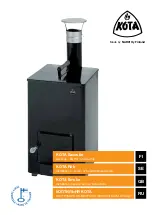
11
OVEN
The oven thermostat light will illuminate until the oven has reached the set
temperature. It will then switch off and on during cooking as the thermostat maintains
the temperature.
Each shelf has a safety stop to prevent it from being pulled out too far when attending
to food. Shelves are removed by pulling them out to the stop and then lifting at the front
to withdraw. Never withdraw loaded shelves beyond their safety stop position. The oven
cooking charts are a guide only, giving approximate cooking temperatures and times.To
suit personal taste and requirements it may be necessary to increase or decrease
temperatures by 10˚C.
Food should be placed in the centre of the shelf with a gap of at least 25mm (1 inch)
between it and the grill element to avoid burning and ensuring an even cooking.
Do not place food or dishes on the floor of the oven.
OVEN - FAN COOKING
Fan cooking is ideal for large poultry or joints of meat, reducing cooking times and
often eliminating the need for preheating the oven. It is also ideal for batch cooking
where food is cooked on more than one level, because the forced circulation of hot air
gives an even temperature from the top to the bottom of the oven.
When cooking recipes that are not designed for a fan oven, it is recommended that the
temperature is reduced by about 25˚C and the time reduced by about 10 minutes for
each hour. If a large quantity of food is being cooked, it will be necessary to increase
the cooking time to compensate for the extra oven load.
TO USE THE OVEN
1.
Place oven shelves in chosen position (refer to cooking chart).
2.
Turn the main oven control knob clockwise to the required setting. Pre-heating is
not normally necessary, but some foods such as bread, scones and Yorkshire
pudding do benefit from being placed in a hot oven.
Food should be placed in the centre of each shelf to allow for even air circulation
around the food.












































